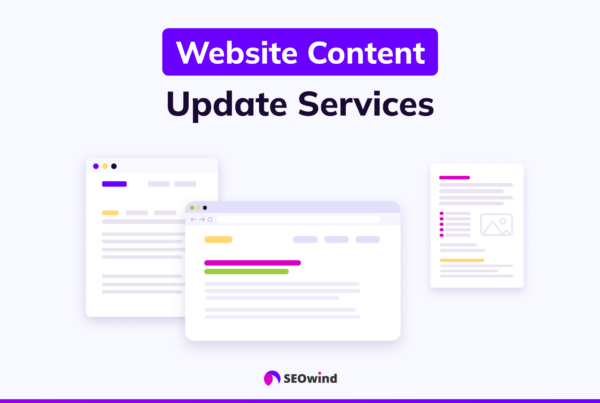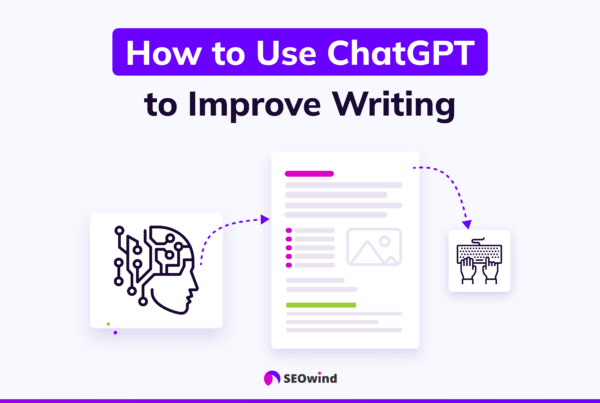Mastering search engine optimization (SEO) is crucial for any website’s success. One critical aspect of SEO is knowing how to effectively search for keywords on a website. In this comprehensive guide, we will unveil a tested method that will enable you to instantly analyze and discover the most relevant keywords on any website, giving you an edge in optimizing your content and outranking your competition.
Whether you’re an SEO expert or a beginner, our step-by-step approach will empower you to check keyword popularity, search volume, and competition with ease.
So, let’s dive in and uncover the secrets behind efficiently searching for keywords on a website!
TL;DR
- Searching for keywords on a website is crucial for SEO optimization, competitor analysis, content development, and keyword gap analysis.
- Satisfying search intent, covering topical depth, plugging keyword gaps, discovering keyword ideas, and ranking better are key reasons to search for keywords on a website.
- Manual inspection, browser extensions, keyword research tools, competitor analysis, and Google Search Console are effective methods to search keywords on a website.
- Avoid relying on obsolete meta keyword tags and keyword stuffing when searching for keywords on a website.
- Do not overlook the importance of long-tail keywords, user experience, and semantic search in your keyword research process.
- Google Keyword Planner, SEMrush, Ahrefs, Ubersuggest, SEOwind, and KWFinder are popular keyword research tools for finding keywords on a website.
- Screaming Frog is a powerful website crawler that can help you find keywords on a website by analyzing various on-page elements such as titles, meta descriptions, and headings.
- Manually inspecting the content of a webpage and using browser extensions like SEOquake or MozBar can provide insights into keyword density and usage.
- Analyzing competing URLs can help you discover additional relevant keywords and understand your competition’s strategies.
- Leveraging Google Search Console allows you to identify which keywords drive traffic to specific web pages within your website.
What does Search For Keywords on a website refer to?
A website search for keywords refers to the process of identifying and analyzing the most relevant and high-impact keywords used within a particular website’s content. This practice is essential for several reasons:
- SEO Optimization: By understanding what keywords a website is targeting, you can improve your own content’s search engine ranking, making it more visible to your target audience.
- Competitor Analysis: Observing the competitive keywords’ choices of your competitors allows you to gain valuable insights into their strategies, helping you refine your approach.
- Content Development: Uncovering the popular keywords in your niche assists in generating content ideas that resonate with your audience and address their needs.
- Keyword Gap Analysis: Comparing your website’s keywords with those of your competitors helps identify potential areas for improvement, ensuring you cover all relevant topics.
Essentially, the ability to identify keywords on a website equips you with the necessary tools to optimize your content, stay ahead of the competition, and enhance your online presence. In the following sections, we will explore various methods and tools that can be employed to conduct a thorough website search for keywords effectively.
Why Search For Keywords On A Website?

Searching for potential keywords on a website is an essential practice for any website owner or content creator aiming to improve their SEO, gain a competitive edge, and provide value to their audience.
Let’s delve into the specific reasons why you should get yourself familiar with the keyword research process:
1. Satisfy Search Intent Better
Understanding the keywords used on a website helps you grasp the search intent of your target audience. By catering to their search intent, you can create content that directly addresses their queries, concerns, and needs. This increases the likelihood of users finding and engaging with your content, resulting in higher traffic and conversions.
Right now, search intent is one of those most important ranking factors that can boost your website into those top coveted spots. You want to make sure your content is aligned with the purpose of the internet user to make sure they find their way to your website.
2. Cover Topical Depth
When you research keywords on a website, you gain insights into the depth of topics covered. This knowledge enables you to create comprehensive content that provides exhaustive information about a subject, making your website a valuable resource for users. In turn, this can boost your topical authority and credibility within your niche.
This site search helps you find the right keywords that Google is looking for. Once you have your keyword list, you eliminate fluff from your website content and show Google that you are an authority and can be trusted.
3. Do Keyword Gap Analysis
By comparing the keywords used on your website with those of your competitors, you can identify keyword gaps – areas where your content may be lacking or underperforming. Addressing these gaps allows you to cover all relevant topics in your niche, enhancing your website’s overall relevance and appeal to both users and search engines.
4. Discover Keyword Ideas
Studying the related keywords employed by successful websites in your industry can inspire new keyword ideas for your own content. You can uncover high-performing long-tail keywords, phrases, and topics that resonate with your audience, giving you fresh ideas for content creation and optimization.
5. Rank Better
Ultimately, the primary goal of finding keywords on a website is to improve your search engine rankings. By optimizing your content with relevant keywords and addressing user intent, topical depth, keyword gaps, and discovering new ideas, you enhance your website’s visibility in search results. This leads to increased organic traffic, higher click-through rates (CTR), and better user engagement – all key factors in achieving higher search engine rankings.
Having better, more thorough content than your competitor helps you get that edge you are looking for. But your site searches must be very good as you won’t be the only one using this strategy.
How You WILL NOT Find A Website’s Keywords
While there are effective methods for searching keywords on a website, there are also some misconceptions and outdated techniques that you should avoid.
Here are some practices that will not help you find a website’s keywords:
1. Relying on Meta Keyword Tags
In the early days of SEO, website owners used meta keyword tags to inform search engines about the targeted keywords for a particular page. However, these tags have become obsolete and are no longer considered by search engines like Google. Focusing on meta keyword tags will not provide any valuable insights into a website’s keywords.
- <meta name=” keywords”>- This method was abandoned long ago and you will not find much useful information looking at this code. But you can always try just in case you find someone who still uses it.
- <title>- A keyword may be there but this is more of a clue as to what the web page creator intended to use for a target keyword. You might get one keyword per page if you go by this method.
2. Keyword Stuffing
Some people might think that simply cramming a webpage with top keywords will make it easy to identify the website’s keywords. However, this practice, known as keyword stuffing, is frowned upon by search engines and can result in penalties or lower rankings. It’s essential to use specific keywords naturally and strategically within your content.
3. Overlooking Long-tail Keywords
Focusing solely on high-volume, short-tail keywords can limit your understanding of a website’s keyword strategy. Long-tail keywords, which are typically longer and more specific phrases, often have lower search volume but higher conversion rates due to their specificity. Ignoring long-tail keywords in your analysis may lead to missed opportunities for targeting valuable niche topics.
4. Ignoring User Experience
Finding a website’s keywords is not just about analyzing the text on the page; it’s also crucial to consider how users interact with the content. Engaging content that addresses user intent and provides value is more likely to rank well in search results, regardless of specific keyword density or placement.
5. Neglecting Semantic Search
Search engines have evolved to understand the context and meaning behind users’ queries, which means they’re more focused on semantic search than exact keyword matches. Therefore, solely relying on exact keyword matching can limit your understanding of a website’s overall content strategy.
How To Search Organic Keywords On A Website
You now have the Why You Check Keywords On Website, the next step is to get the How To Search For Keyword.
Identifying keywords on a website involves using various tools and techniques to analyze and discover the most relevant and high-impact keywords. Let’s explore some of the most effective methods for conducting SEO keyword research on a website:
1. Manual Inspection within a website
One of the simplest ways to search for keywords on a website is through manual inspection. Browse through the website’s content, headings, meta tags, and URLs to identify the keywords used. Although this method can be time-consuming, it provides a valuable understanding of how the website incorporates keywords into its content. However, this is not a very accurate or generous method.
You can approach it in the following way:
- ‘Find within Page’ search. This is done by pushing the CTRL + F keys on your keyboard. This should turn up a few keywords you may not have thought of when you wrote your content.
- Look for long-tail keywords. These are keyword phrases that have 4 or more words related to the topic. These should appear more than once throughout the web page.
- Find keywords in the page source – Right-click on your mouse when you are on another website and use the page source code to search keywords used by that competitor. You can look in the following spots for those main keywords- title tag, meta tag, headers, in the first several paragraphs of content, and in the URL. Those keywords should appear more than once.
2. Use Google search operators to search within a single website
This is a top site search tool and you can mine an entire website for keywords at the same time. The steps to do this are as follows:
- Type site:yourdomain.com search term in Google search bar
- For exact match keywords, use quotation marks and type in site:yourdomain.com “search term”
- Hit Search
Make sure to replace the ‘yourdomain.com’ with the URL of the website you wish to mine. Place the keyword you are researching where the phrase ‘search term’ is located.
3. Use Browser Extensions for Keyword Search
Several browser extensions can help you analyze a website’s keywords with ease. Some popular options include SEOquake, Keywords Everywhere, and MozBar. These extensions provide insights into a webpage’s keyword usage, density, and metadata, allowing you to quickly identify the targeted keywords.
4. Utilize Keyword Research Tools
Keyword tools are indispensable when searching for keywords on a website. Some popular tools include:
- SEOwind
- Google Adwords Keyword Planner
- SEMrush
- Ahrefs
- Ubersuggest
- KWFinder
These tools allow you to input a URL and receive a comprehensive analysis of the targeted keywords, search volume, competition, and more. This data can be invaluable when optimizing your content or discovering new keyword ideas.
5. Analyze Competitor Websites
Studying your competitors’ websites is an excellent way to uncover new keyword opportunities and understand their strategies. Use the aforementioned research tools to analyze their content and identify high-performing keywords that may be beneficial for your website.
6. Leverage Google Search Console
Google Search Console is a powerful tool that provides insights into your website’s performance in Google Search. By connecting your website to the platform, you can access data regarding which keywords drive traffic to your site, allowing you to optimize your content accordingly.
By utilizing these methods, you can effectively perform a keyword search on any website, optimize, make your content SEO friendly, and improve your SEO performance.
Looking for some more keyword research tips: How to Do Keyword Research in minutes – 11 Tips & Tools
How To Find Keywords On A Website using Keyword Research Tools
Keyword research tools are essential for efficiently and effectively searching for keywords on a website. These tools not only help you identify the targeted keywords but also provide valuable insights into their performance, competition, and relevance. Here are some popular keyword research tools and how they can be used to find keywords on a website:
SEOwind – a user-friendly keyword research tool
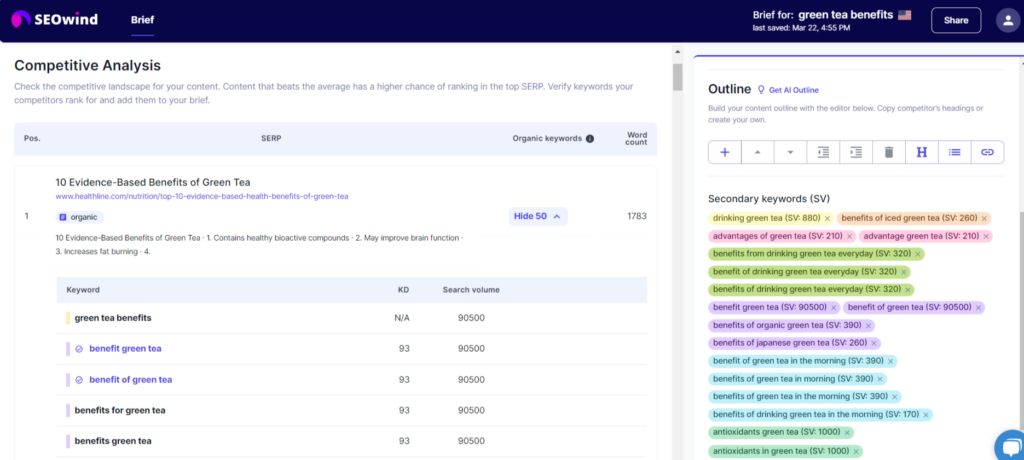
If you’re looking for a tool that will help you find what keywords a page ranks for, this is for you. Although the primary goal of SEOwind is to create SEO-optimized content briefs, it is a pretty powerful keyword research tool as well.
As a part of its competitive analysis, SEOwind goes through top SERPs and finds the keywords those pages rank for. It shows you only keywords with a search volume above 10 and that the pages rank in the top 30.
Google Adwords Keyword Planner
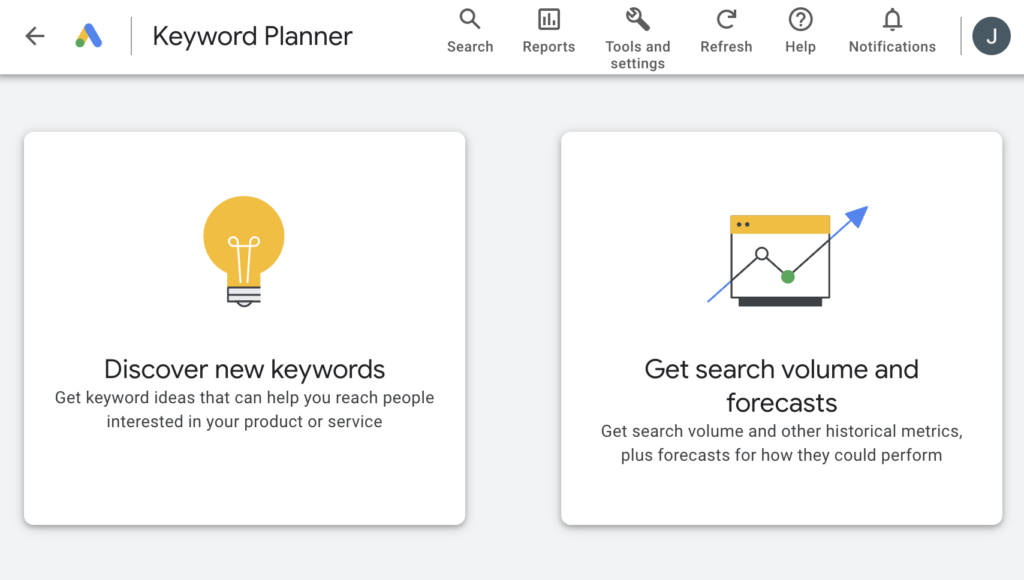
It is a free tool provided by Google Ads that offers keyword suggestions, search volume data, and competition levels. Although primarily designed for advertisers, it’s an invaluable resource for SEO purposes as well.
To find keywords on a website::
- Sign in to your Google Ads account.
- Navigate to the “Tools & Settings” menu and select “Keyword Planner.”
- Click on “Discover new keywords” and enter the URL of the website you want to analyze.
- The tool will generate a list of keyword ideas related to the content found on the website.
SEMrush
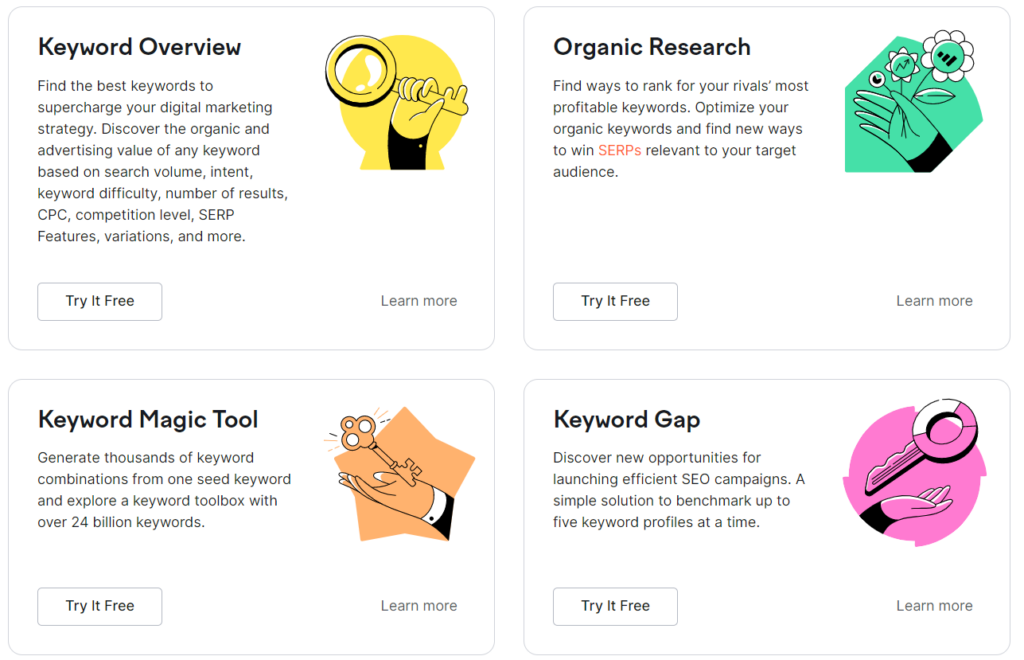
SEMrush is a comprehensive SEO tool that provides a wealth of information about a website’s keywords, backlinks, and traffic.
- Enter the URL of the website you want to analyze in the SEMrush website’s search bar.
- Navigate to “Organic Research” under “Domain Analytics” in the left menu.
- The report will display the website’s top organic keywords, their positions in search results, search volume, and more.
Ahrefs
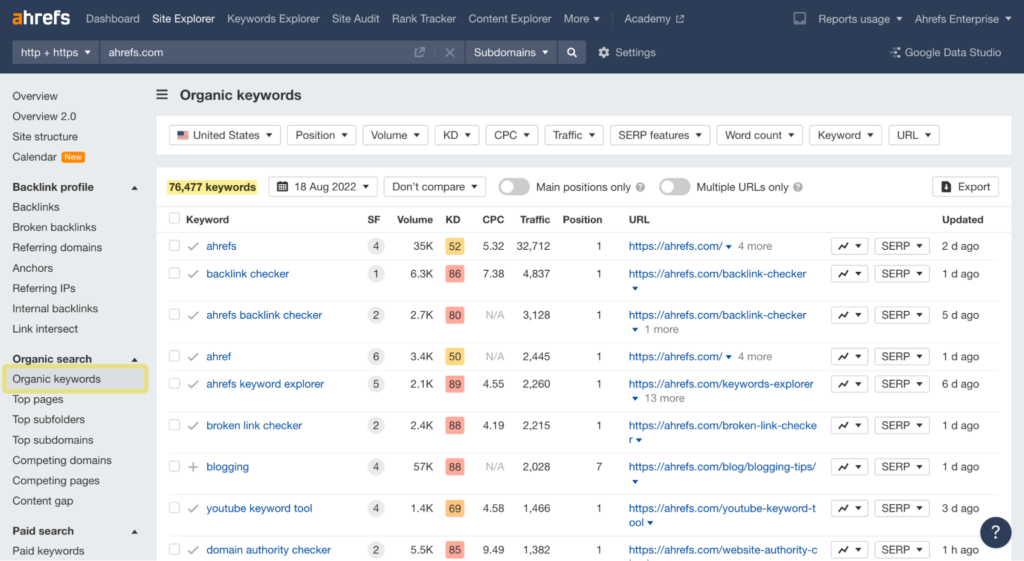
Ahrefs is another powerful SEO tool that offers detailed keyword data and analysis. With its Site Explorer feature, you can easily find the keywords on any website.
- Enter the URL of the website you want to analyze in the Site Explorer search bar.
- Navigate to the “Organic Keywords” report under “Organic Search” in the left menu.
- This report will show you the top organic keywords for the analyzed website, including search volume, keyword difficulty, and current ranking positions.
Ubersuggest
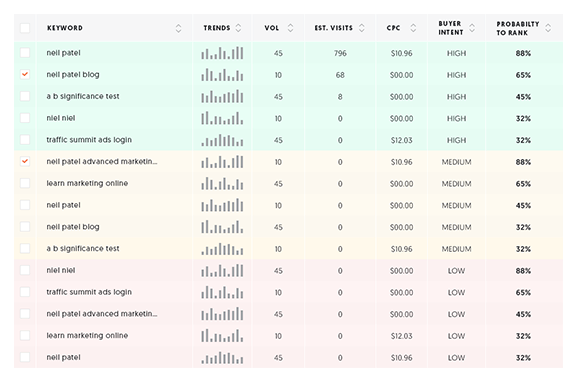
Ubersuggest is a user-friendly keyword tool developed by Neil Patel, providing insights into a website’s keywords, search volume, and content ideas.
- Enter the URL of the website you want to analyze in the search bar.
- Select the “Keywords” option from the left menu.
- The tool will display a list of organic keywords for the website, along with search volume, ranking position, and other relevant data for a given keyword.
How Does Google Determine Which Keyword Your Site Shows For?
Google uses a complex algorithm to evaluate websites and decide which keywords they should rank for in search results. Key factors influencing this decision include:
- Relevance – Google analyzes your website’s content, including title tags, meta descriptions, headings, and body text, to determine its relevance to specific keywords.
- Content Quality – Websites with well-written, informative, and engaging content that addresses user intent are more likely to rank well for targeted keywords.
- User Experience (UX) – Factors like page load speed, mobile-friendliness, easy navigation, and readability contribute to a positive UX, which influences keyword rankings.
- Backlinks – High-quality backlinks from reputable sources signal that your content is valuable and reliable, leading to improved keyword rankings.
- On-Page SEO – Proper on-page SEO optimization ensures that Google can easily understand your website’s content and associate it with relevant keywords.
- Semantic Search – Google focuses on understanding the context and meaning behind users’ queries rather than exact keyword matches, so consider related terms and concepts when optimizing for keywords.


